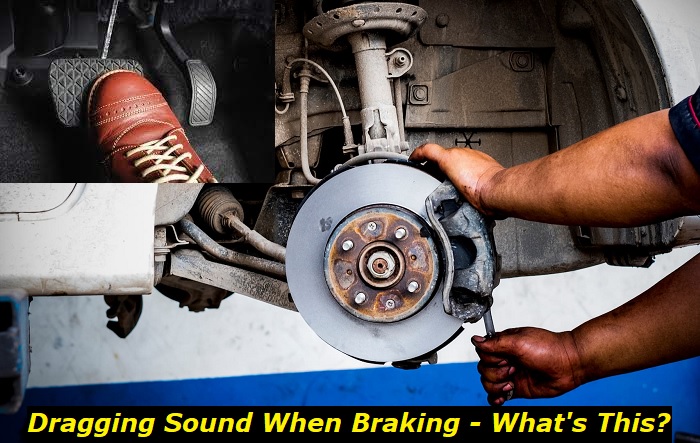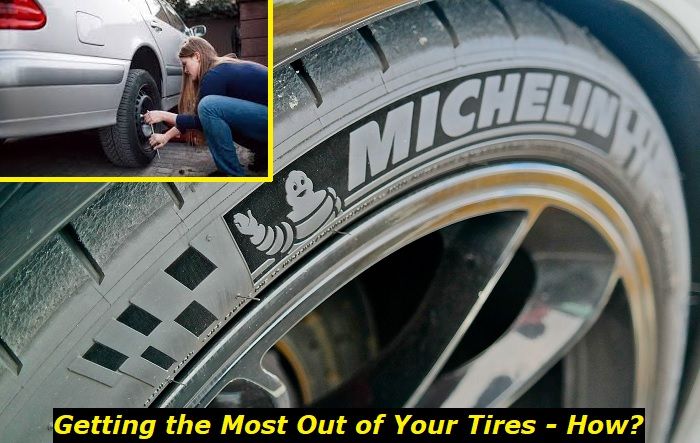When it feels like something is dragging in your car when you brake, the problem is most likely with the brake pads that are totally worn out. But there are some more possible issues like bent brake rotors, different objects in brakes, worn-out calipers, etc.
Brake pads problems highlights
- Level of urgency:super-urgent
- DIY diagnostics:possible but complicated
- DIY repairs:impossible
- Price for repair:$250 - $450
- Common symptoms:sounds when braking, unintentional braking, warped rotor
- Commonreasons:bad pads, improper installation, old pads
- If ignored:rotor wear, bad brakes, damage to the system

Let's look at the symptoms of dragging sound in brakes
Whenever you hear the dragging sound in your car, you may think that something fell off and now is dragging. But then you suddenly notice that this weird sound appears in that case only if you press the brake pedal. When the car is going without braking, everything is fine. Obviously, this is not the piece of exhaust pipe that was corroded and fell off the car. If it was the pipe, it wouldn't react to braking.
So, quick deduction allows you to make a certain conclusion that the problem is with brakes. To make sure we are on the same page, let's quickly go through the symptoms of the problem that I'm describing in today's article.
Here they are:
- your car feels just fine on the road unless you press the brake pedal;
- whenever you are trying to brake, you hear a sound that resembles dragging;
- there is nothing wrong under the vehicle - nothing fell off and nothing is dragging on the road surface;
- your brake warning light may go on letting you know something is wrong with the brakes;
- the brake fluid level may go a little down but still remain at the normal level for driving;
- the sound is always on one side of the vehicle;
- sometimes, the sound may disappear and your car goes well like nothing happened;
- but after you pass some intersections, the problem reappears;
- there may be some other sounds like scratching, whistling, grinding, etc.
It's not hard to understand that the sound comes from the brakes. Just drive your car and then press gently the brake pedal several times. Does this sound only appear when the brake pedal is pressed? You are having issues with the braking system.
Now, it's very important to react immediately because driving with worn-out brakes is not a very bright idea.
What should you do if you hear a dragging noise from the brakes?
I've prepared a little troubleshooting guide for those who may want to get their hands dirty and locate the issue on their own. But you may still want to let professionals do this job for you.
Here's what you should do if you hear a dragging sound when braking:
- Stop your vehicle gently and safely after you make sure that exactly pressing the brake pedal initiates this sound.
- If you don't want to get your hands dirty, find a safe way to bring the car to the dealership or any trusted repair shop.
- If you do want to dig a little deeper, get a car jack and a wheel wrench.
- Make sure you put something hard under the rear wheels to avoid the car moving when you jack it up.
- Jack up the car on one side (start with the side where you heard the noise from) and unscrew the wheel nuts or bolts.
- Look at the pads from both sides of the rotor. Also, look at the condition of the brake rotor - it may be scratched if the problem is in this wheel.
- If everything is fine, check the other wheels. Eventually, you will find the brake pad that is faulty or locate the other problem that causes the dragging sounds.
- Now you can go to the auto parts store and buy needed parts for repair.
If you have experience in replacing brake pads, you may even want to repair your vehicle on your own. But if you don't know how to do it, better let specialists help you with the repair. Changing brake shoes is a pretty simple but very responsible task. One mistake can lead to other brake damage and loss of safety on the road.
There aren't too many issues that can lead to dragging noises when your car is braking. So, it won't be really hard for you to find the problem. But if you aren't going to replace the worn-out pads or some other parts, why would you even unscrew those wheel bolts? Just get your car to the repair shop.
What are the possible reasons for dragging sounds in brakes?
Well, it's time to move on and see which problems can lead to dragging sounds when you brake. The choice is not that wide, but some options still exist. I will focus on the problems and will only give some tips on how to solve these issues.
Here's what you should check:
1. Brake pads are worn out
In 90% of cases, when you hear the dragging noise when braking, one of the brake shoes will be in charge. Brake pads are made of two parts - the metal mounting and the soft pad. When the soft pad is worn out, the metal part will start scratching the brake rotor. This will lead to a special sound that may remind grinding or dragging.
It's not only bad because of the weird sound that you hear when braking. This situation will also gradually damage the brake rotor. If you keep driving even a couple of miles like this, your rotor may require some maintenance or even replacement.
What you can do is replace the brake pads as soon as possible. Better replace all pads at once because they will fail one after another.
2. The soft pad fell off on the brake shoe
The brake shoe may have fallen apart and the soft pad is now jumping around in the brake system of your car or it may have even got stuck. In this case, the dragging or grinding noise may not only appear when you press the brake pedal. It may also show up randomly or be there constantly.
The cure is still the same - you should replace the broken brake pad as soon as possible. If you don't do that, the piece of the pad may ruin the entire braking system in one of your wheels. This will lead to catastrophic loss of control over your vehicle and to very expensive repairs.
3. The rotor is worn out
Also, the dragging sound may appear because the rotor is fatally worn out and requires replacement. After some time, brake pads dig a certain pit in the brake rotor. When it's about 1 millimeter, you can still safely drive. But when the pit is too deep and the brake pad starts touching its edge, the unpleasant noise may show up.
This situation is less dangerous and you can keep on driving. But the best choice is to drive directly to the dealership. Brake rotor replacement is a little more expensive than just the change of pads, but if they are worn out, you shouldn't just ignore this situation.
4. Other objects in the braking system
Something may have got between the pad and the rotor or just near the pad. It may be a stone or a piece of metal, whatever. When you press the brake, this object may also be pressed against the rotor and create a grinding sound. This means that you will hear this randomly at any time of the day.
Actually, repairs in this case are the cheapest and the fastest. You will just need to take the wheel off the car and see if there is some object that shouldn't be there in the braking system. Also, make sure that the brake rotor is not damaged. In some cases, you will need to maintain or replace it along with the brake pads after this.
5. The caliper or drum is broken
Brake calipers are pretty simple in construction and are rarely broken. But they may fail in high-mileage vehicles or in cars that are driven very aggressively. When a brake caliper fails, it may start braking in the wrong way and pressing the brake pads to the rotor unevenly. Sometimes, this can also lead to dragging-like sounds because some metal part of the caliper may be pressed to the rotor.
If your rear wheels are equipped with drum brakes (which is a pretty rare thing nowadays), they are even more likely to produce different sounds than disc brakes. Drums are not very reliable and can lead to all types of issues including weird sounds and even blocking of the wheel. Repairing a drum is not as easy as maintaining the disc brake.
Final thoughts
So, now you know what can lead to issues with your brakes and to dragging sounds from your wheels. Inspecting the braking system should now be easier for you. But remember that any kind of repair in brakes should be conducted by a trained professional. One little mistake can lead to really bad consequences.
About the authors
The CarAraC research team is composed of seasoned auto mechanics and automotive industry professionals, including individuals with advanced degrees and certifications in their field. Our team members boast prestigious credentials, reflecting their extensive knowledge and skills. These qualifications include: IMI: Institute of the Motor Industry, ASE-Certified Master Automobile Technicians; Coventry University, Graduate of MA in Automotive Journalism; Politecnico di Torino, Italy, MS Automotive Engineering; Ss. Cyril and Methodius University in Skopje, Mechanical University in Skopje; TOC Automotive College; DHA Suffa University, Department of Mechanical Engineering






Add comment